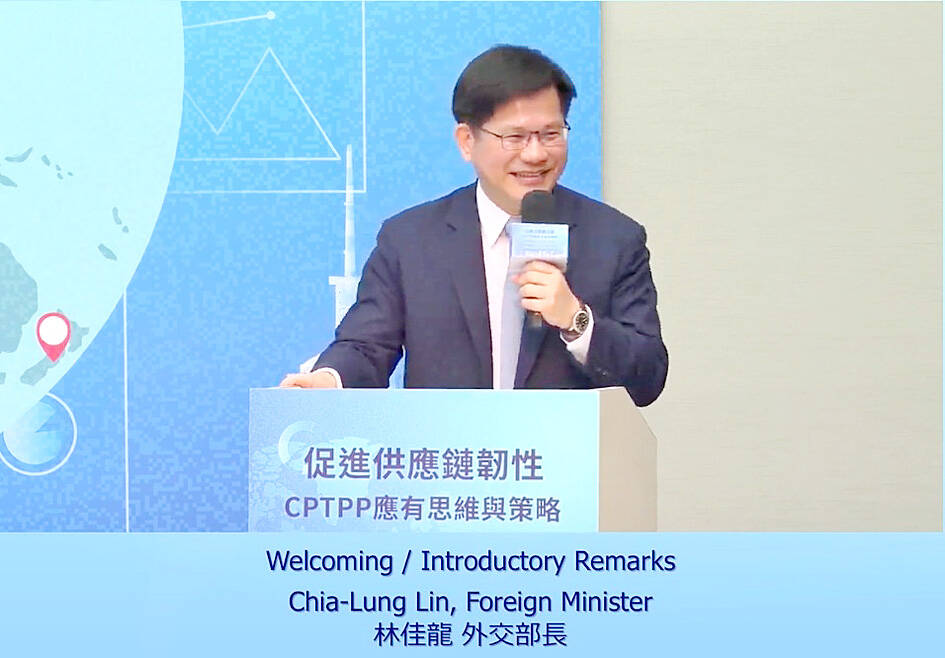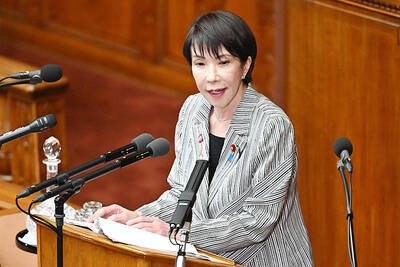Joining the Comprehensive and Progressive Agreement for Trans-Pacific Partnership (CPTPP) is a key policy objective, and Taiwan’s accession to it would expand the platform’s economic and trade influences, Minister of Foreign Affairs Lin Chia-lung (林佳龍) said in a speech at a seminar in Taipei yesterday.
“The CPTPP is the most representative economic agreement in the Indo-Pacific region,” Lin told the Promoting Supply Chain Resilience — the Thinking and Strategies for the CPTPP seminar organized by the Chung-Hua Institution for Economic Research (中華經濟研究院). “As Taiwan is an export-oriented country, stable international market access is crucial for our economy.”
President William Lai (賴清德) in his inauguration address in May noted that Taiwan has applied to join the CPTPP and continues to participate in regional economic integration, Lin said.

Photo courtesy of the Chung-Hua Institution for Economic Research
“It is one of the government’s key policy objectives,” he said, adding that he has advocated the concept of “integrated diplomacy” — which includes value diplomacy, democracy alliance diplomacy and economic diplomacy — so CTPTT participation would be a key component of a holistic approach.
The world has faced disruptions to supply chains caused by changes in the geopolitical landscape and authoritarian states have attempted to engage in economic coercion to achieve political goals, he said.
The challenges have prompted the US, the EU and others to prioritize supply chain diversification, reduce excessive dependence on China, and adopt policies to boost economic resilience and security, he said.
Taiwan has a semiconductor industry that excels in design, system integration, research and development, and manufacturing, he said, adding that it is a world leader in information and communication technology product manufacturing.
“It underlines our critical role in maintaining economic security in the Asia-Pacific region and upholding global supply chains,” Lin said. “Clearly, Taiwan’s accession to the CPTPP would expand the platform’s economic and trade influence.”
Taiwan last year ranked 16th globally in terms of export value at US$432 billion and 19th in total trade value at US$784 billion, he said.
“Taiwan’s performance demonstrates that it has the capacity to contribute more substantially to the international trade system,” he said, adding that the nation has completed legal reforms to ensure its economic and trade system meets with the CPTPP’s requirements.
“Should Taiwan be included, it would open its market as required of all CPTPP member states,” he said.
Taiwan has been a member of the WTO for more than 22 years and has consistently honored its international commitments, despite an escalation of trade and other disputes, he said.
“Taiwan remains committed to resolving disputes and promoting a transparent, predictable and rules-based trading system,” he said.
Moreover, Taiwan has made significant progress in digital transformation, as well as advancing the goal of net zero carbon emissions by increasing cumulative renewable energy storage capacity eightfold in seven years, he added.
Taiwan’s inclusion in the CPTPP would allow the integration of its expertise into member countries’ markets and also accelerate industrial upgrading throughout the CPTPP community, he said.
CPTPP members last year agreed on the Auckland Principles for new accessions, which require potential members to meet high standards, including having a good record of complying with trade rules and commitments, and possessing the capacity to gain consensus support from CPTPP members.
“We believe and hope that member states will reach a consensus based on the first two criteria, and avoid political considerations unrelated to economic and trade issues,” he said. “All applications for membership should be treated fairly and objectively.”
Taiwan also encourages members to consult Taiwan and establish a working group for the nation’s membership, he added.
Meanwhile, Minister Without Portfolio Jenni Yang (楊珍妮), the nation’s top trade representative, in her keynote speech at the seminar said that the CPTPP represents nearly 15 percent of the global economic output, with a combined GDP of about US$15.4 trillion.
If Taiwan can join the CPTPP, it would become the sixth-largest economy in the bloc, after Japan, the UK, Canada, Mexico and Australia, she said.
“Exclusion from the CPTPP would limit Taiwan’s ability to adapt to pressing global challenges,” Yang said. “Taiwan will lose the opportunity of gaining an extra 1.6 percent of GDP growth in the long run.”
The global trading system is facing multiple challenges, including supply chain disruptions, climate change, digital transformation, cybersecurity, geopolitical tensions and economic coercion, she said.
The complexity and uncertainty require like-minded countries to work together to think about how to strike a balance between managed trade and liberal trade to safeguard their interests, she added.
Regarding what role Taiwan would play as a CPTPP member, Yang said it would be a “trusted trading partner,” as it is committed to adhering to international trade rules — even when it is not yet a CPTPP member — and it has never been involved in trade litigation or investment arbitration.
Moreover, according to the Heritage Foundation’s Index of Economic Freedom, Taiwan is the second-freest economy in Asia and fourth globally, she said, adding that Taiwan is negotiating with the US and the UK to adopt standards higher than the CPTPP on the environment, labor and digital trade.
“In joining the CPTPP, Taiwan will not be a troublemaker, but rather work together with all CPTPP members to foster a stable trade and investment environment in the Asia-Pacific region,” she said.

The Central Weather Administration (CWA) yesterday said it expected to issue a sea warning for Typhoon Fung-Wong tomorrow, which it said would possibly make landfall near central Taiwan. As of 2am yesterday, Fung-Wong was about 1,760km southeast of Oluanpi (鵝鑾鼻), Taiwan’s southernmost point, moving west-northwest at 26kph. It is forecast to reach Luzon in the northern Philippines by tomorrow, the CWA said. After entering the South China Sea, Typhoon Fung-Wong is likely to turn northward toward Taiwan, CWA forecaster Chang Chun-yao (張峻堯) said, adding that it would likely make landfall near central Taiwan. The CWA expects to issue a land

Taiwan’s exports soared to an all-time high of US$61.8 billion last month, surging 49.7 percent from a year earlier, as the global frenzy for artificial intelligence (AI) applications and new consumer electronics powered shipments of high-tech goods, the Ministry of Finance said yesterday. It was the first time exports had exceeded the US$60 billion mark, fueled by the global boom in AI development that has significantly boosted Taiwanese companies across the international supply chain, Department of Statistics Director-General Beatrice Tsai (蔡美娜) told a media briefing. “There is a consensus among major AI players that the upcycle is still in its early stage,”

The Central Weather Administration (CWA) yesterday said it is expected to issue a sea warning for Typhoon Fung-wong this afternoon and a land warning tomorrow. As of 1pm, the storm was about 1,070km southeast of Oluanpi (鵝鑾鼻), Taiwan’s southernmost point, and was moving west-northwest at 28 to 32kph, according to CWA data. The storm had a radius of 250km, with maximum sustained winds of 173kph and gusts reaching 209kph, the CWA added. The storm is forecast to pass near Luzon in the Philippines before entering the South China Sea and potentially turning northward toward Taiwan, the CWA said. CWA forecaster Chang Chun-yao (張峻堯) said

Japanese Prime Minister Sanae Takaichi yesterday said that China using armed force against Taiwan could constitute a "survival-threatening situation" for Japan, allowing the country to mobilize the Japanese armed forces under its security laws. Takaichi made the remarks during a parliamentary session while responding to a question about whether a "Taiwan contingency" involving a Chinese naval blockade would qualify as a "survival-threatening situation" for Japan, according to a report by Japan’s Asahi Shimbun. "If warships are used and other armed actions are involved, I believe this could constitute a survival-threatening situation," Takaichi was quoted as saying in the report. Under Japan’s security legislation,